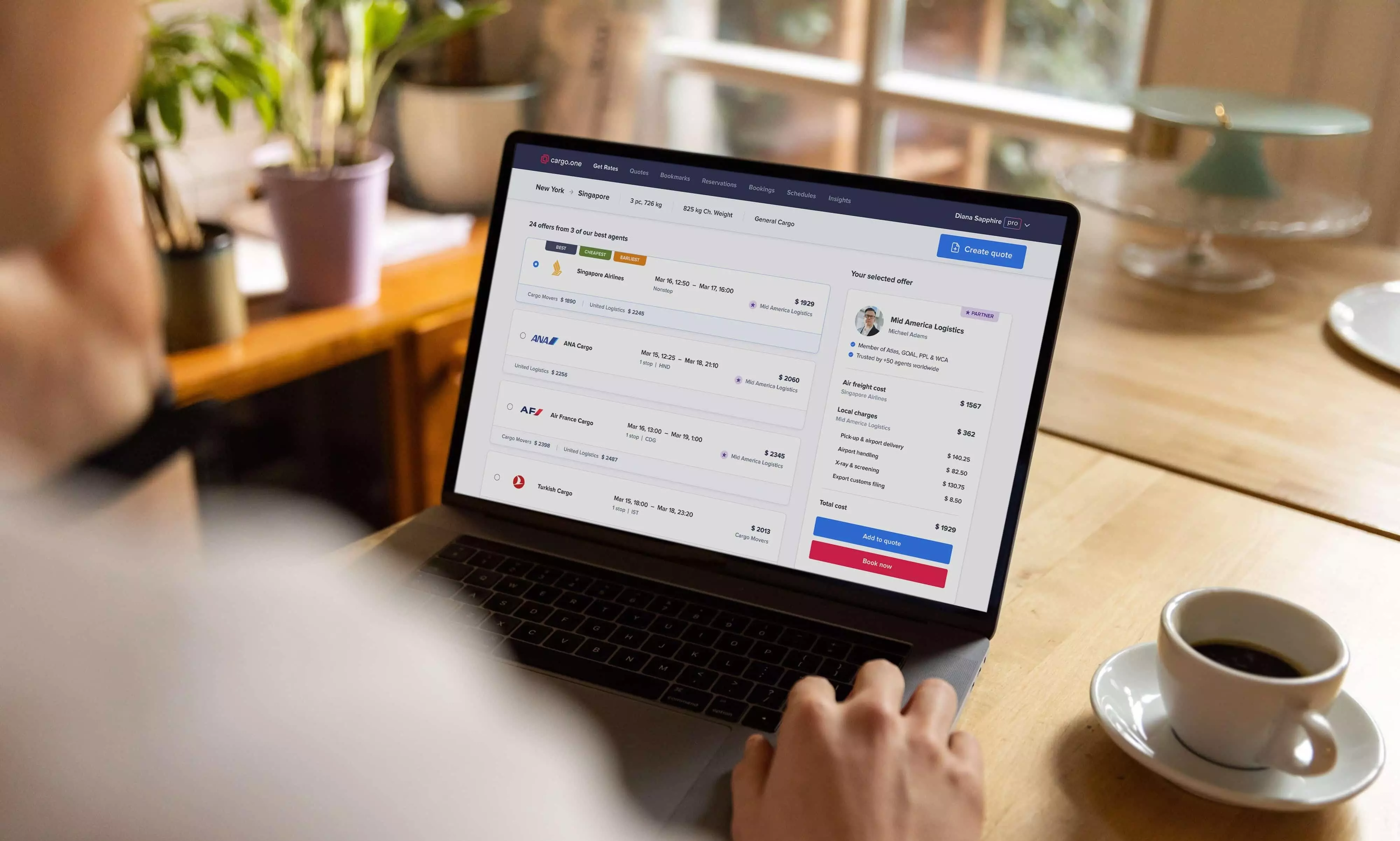
How digitalisation is optimising air cargo

The air cargo industry is undergoing a digital revolution, leveraging cutting-edge technologies to streamline operations, enhance efficiency, and meet the evolving demands of customers in an increasingly competitive global market.
“The biggest opportunity for the air cargo industry is digitalisation. This hasn't progressed as quickly as we hoped, but the progress is real,” said Brendon Sullivan, Global Head of Cargo at the International Air Transport Association (IATA), during the World Cargo Symposium, 2024. According to a report by International Data Corporation, global spending on digital transformation is projected to reach nearly $3.9 trillion by 2027, with a five-year compound annual growth rate (CAGR) of 16.1%. Amid this surge, the air cargo industry is undergoing a significant transformation, embracing the digital revolution to enhance its operations and efficiency.
From cutting-edge technologies like artificial intelligence (AI) and the Internet of Things (IoT) to blockchain, automation and more, the industry is leaving no stone unturned in its quest for efficiency, transparency, and sustainability. Leading this transformation are top digital solution providers who are driving innovation and shaping the future of air cargo operations.
Key challenges
While the benefits of digitalisation are evident, establishing a cohesive digital ecosystem in the air cargo industry is no small feat. One of the primary challenges is the need for collaboration and standardisation among various stakeholders, including carriers, airports, ground handlers, and regulatory authorities.
“Collaboration is crucial but difficult due to the need for seamless integration between diverse stakeholders, such as airlines, freight forwarders, and customs authorities. Each entity often operates using different systems and standards, making interoperability a significant hurdle,” said Sabari Ramnath, Industry Expert-Freight & Logistics, Unisys.
Another significant challenge highlighted by experts is the need for robust cybersecurity measures to protect sensitive data and systems from potential threats. Underscoring the same, Ed Dorr, eCargo Portfolio, CHAMP Cargosystems mentioned, “There’s a need to ensure data security and privacy while transitioning from paper-based to digital processes. As the industry becomes increasingly reliant on digital technologies, ensuring the integrity and privacy of data is paramount.”
“IoT will revolutionise cargo tracking and monitoring by providing real-time visibility into shipments & location, condition, and status throughout the supply chain.”
-Sabari Ramnath of Unisys
Dr Krishna Kumar Nallur, CEO, SpeedCargo further highlighted the critical role of data in optimising air cargo operations. He stated, “If we want to maximise capacity and make operations more efficient, then data on the physical cargo that flows through the network is crucial. Currently, the industry does not have the basic layer of data for the technologies to operate upon.”
The disruptive potential of digitalisation
Technologies such as AI, machine learning (ML), IoT, robotics and blockchain among others will play a pivotal role in reshaping air cargo operations over the next 5-10 years.
In March 2024, Airbus announced the launch of OpenCargoLab, a collaborative initiative in partnership with CHAMP Cargosystems, Fraport, KLM Cargo, Kuehne+Nagel, and Swissport. This initiative aims to drive digital and resource-saving concepts to enhance airfreight processes. As part of the initiative, Airbus will explore digital solutions, including augmented reality and robotics, to optimise data connectivity and improve the transportation of goods.
“We see tremendous transformation in applying AI to how rates are displayed and negotiated. Less and less personal messaging the “ping pong” style,” stated Edip Pektas, founder, Airblox while discussing the role of AI in the air cargo industry.
“The quickest wins from AI and ML surround automation and contextualisation. cargo.one is progressing the areas where we can make a real improvement to forwarders’ productivity and win rates,” mentioned Moritz Claussen, Founder & Co-CEO, cargo.one. For example, cargo.one uses automation to convert customer emails into quotes, and ingest rates dynamically into rate management systems with great precision, so the data is available where it drives most value.
“Currently, the industry does not have the basic layer of data for the technologies to operate upon.”
-Dr Krishna Kumar Nallur of SpeedCargo
Lucas Fernandes, VP- Innovation and Insights, CHAMP Cargosystems, highlighted the significant investments by tech giants in ML infrastructure. Adding to it, he stated, “As barriers to adoption decrease, technology vendors and IT departments can integrate these advancements into IT solutions and work environments.”
Furthermore, Ian Arroyo, Chief Strategy Officer, Freightos, discussed the impact of AI and ML on the logistics industry. He mentioned how advancements in digital systems have made structured data more accessible, enhancing various processes. “WebCargo, a digital booking solutions provider acquired by Freightos, utilises AI-driven search autofill and data-driven alternative suggestions to improve booking efficiency by leveraging structured data. These technologies, combined with natural user engagement, can transform operations, enhancing overall system efficiency and user experience,” he added.
IoT and real-time tracking solutions are also garnering significant attention, enabling cargo carriers to monitor shipments throughout their journey and provide unparalleled visibility and transparency to customers. In January 2024, Air France KLMP Cargo chose SkyCell as its ULD (unit load device) tracking partner and utilised SkyCell’s advanced IoT technology and its SkyMind platform for real-time visibility into ULD operations. In May 2024, Kuehne+Nagel installed gateway readers at their Frankfurt am Main Airport facility as part of Air France KLM Martinair Cargo's partnership with SkyCell to enhance ULD tracking capabilities across the airline’s ULD fleet.
“IoT will revolutionise cargo tracking and monitoring by providing real-time visibility into shipments & location, condition, and status throughout the supply chain. Additionally, advanced automation will play a pivotal role in enhancing operational efficiency and elevating customer satisfaction levels within the air cargo industry,” added Ramnath.
Gautam Mandal, Director- Digital Transformation, CargoFlash Infotech, discussed the benefits of integrating AI with IoT devices in the logistics sector. He pointed out how this combination enables real-time tracking and monitoring of shipments throughout the entire supply chain. “This level of tracking extends from warehouse handling to in-flight cargo and final delivery. Advanced analytics processes large volumes of data from various touchpoints, ensuring accurate and up-to-date tracking information,” stated Mandal.
Moreover, IATA is also tackling air cargo inefficiencies with its initiatives, e-AWB (electronic airway bill) for paperless docs, ONE Record for centralised data, CargoConnect and Interactive Cargo for system communication. Major airlines, logistics and digital solutions providers are already on board, paving the way for a smoother future.
Enabling sustainable operations
Digital cargo booking platforms contribute to sustainability by reducing paper-based documentation, minimising waste, and promoting eco-friendly practices. WebCargo’s e-booking technology facilitates airlines in offering Sustainable Aviation Fuel (SAF) prices and enables access to real-time rates and routes optimised for CO2 emissions. Furthermore, WebCargo, with its air freight CO2 emissions calculator, aligns with EN 16258, the European standard for calculating energy consumption and GHG emissions in transport services, by providing an air freight carbon footprint calculator. This integration supports environmental compliance and empowers logistics decision-makers to make informed, sustainable choices, ultimately reducing carbon emissions.
Shedding light on the impact of better inventory management for ULDs on the environment, Scott Sangster, GM- Global Logistics Service Providers, Descartes Systems Group stated, “Better inventory management of ULDs reduces loss and the need for replacements, translating into less material manufacturing and disposal. According to ULDCare, the industry-wide loss rate of ULDs is approximately 3% annually, equivalent to US$25 million—a significant opportunity for waste reduction and sustainability.”
Vineet Malhotra, Co-founder & Director, Kale Logistics Solutions, highlighted how Kale’s Airport Cargo Community System (ACS) contributes to sustainability. He mentioned, “ACS reduces truck congestion by 80% through advance truck slot booking and dock management, leading to lower CO2 emissions due to reduced fuel consumption.”
Moreover, IATA is also taking major steps towards the future of sustainable digital transformation with the launch of its digital leader charter programme. It aims to streamline operations and boost sustainability. Major cargo companies like Cathay Cargo, Lufthansa Cargo, Cathay Cargo, CHAMP Cargosystems and IBS Software among others are the first to sign on, pledging to collaborate and leverage digital tools for an eco-friendly future.
Achieving greater efficiency and cost reduction
Digital transformation is not only about embracing technologies but also about driving operational excellence and cost reduction. “Digital transformation can improve operations, reduce manual intervention, and speed up document verification, resulting in considerable cost savings and improved operational efficiency,” added Dorr.
Data analytics and AI-powered decision-making are also playing a crucial role in optimising resource utilisation, minimising waste, and enabling real-time adjustments to operations based on data-driven insights.
Dr Nallur further shed light on the need for data-centric solutions in the logistics industry. He stated, “These solutions enable the identification of bottlenecks, productivity enhancement, and optimal resource utilisation. By leveraging new data, airlines and ground handlers can automate workflow steps, intelligently store cargo for flexible loading, and improve operational efficiency even with reduced manpower. Data-informed decisions provide better visibility into cargo flows and trends.”
E-commerce & digital booking
As e-commerce continues to surge, the air cargo industry is gearing up to meet the growing demand for fast and reliable shipping services. Highlighting the future of air cargo and its connection with e-commerce expansion and digital bookings, Malhotra stated, “E-commerce is the driving force behind air cargo growth. In 2022, the total of 170 billion e-commerce parcels was four times higher than in 2014, and by 2027, this number is expected to increase by another 50%. This has led to the rise of our platform, Logistics e-Marketplace (LeMP). It will integrate with systems like ACS to create a robust network of trust and efficiency, further enhancing the air cargo industry’s capabilities.”
To meet this surging demand and facilitate the integration of digital platforms, the air cargo industry is taking flight with digital innovation, efficiency, transparency, and sustainability. As the world connects more, this digital embrace will shape the future of global trade. With a shared vision, the sky's the limit for air cargo excellence.
This was originally published in the June 2024 issue of The STAT Trade Times

